Tips for Going Plastic Free
It’s almost July, and that means the start of #PlasticFreeJuly.
Every year, millions of people all over the world (250 million in 177 countries, to be exact) participate in a challenge called #PlasticFreeJuly. The idea is, they make a commitment to banning the use of plastics, but specifically single-use plastics, for the month of July.
I’m planning on participating. Sort of. Realistically, because of COVID, many of the behaviours I would normally have taken to reduce the amount of plastic would have been easier. Because of the pandemic, some of them are just not possible any more. But I am making a commitment to looking at my plastic use (especially single use plastics) and trying to come up with long-term solutions to creating less waste and going plastic free.
Let’s look, first of all, at the why here. I mean, you’re saying to me, “Rebecca, plastic is recyclable. As long as I’m being responsible and recycling, it’s okay, right?”
Yes. And no. Should you be recycling your plastics? Of course, 100% yes. BUT. Lots of people still don’t, and it takes 450 years for plastic to break down. Secondly, plastic breaks down into microparticles that bind to each other and and basically create a lot of toxicity in the ocean. There are huge rafts of plastic floating around in the ocean and killing marine wild life. Also, fish and marine life eat the microplastics, and then we eat the fish, and well, that’s just not good.
So, yes, you should recycle. But if possible, you should also try to cut back on the amount of single use plastics you use.
You may also be wondering about why I’m talking about plastic on a food blog. The two are tied; as someone who doesn’t eat meat because of sustainability and environmental reasons, it seems reasonable that I’d also be concerned about sustainability in other areas of my life.
Tips for going Plastic Free
Laundry
Let’s start with detergent. First off, you want to use one that’s good for the environment, as that soap is ending up in the ocean for sure. Secondly, try to choose a laundry detergent that does not come packaged in plastic. I just started using TruEarth, and it’s great. First of all, it really works, which, let’s face it, is super important. Secondly, you only need a tiny strip for a whole load of clothes, and it works perfectly well in cold water (requiring less energy). Finally, it comes packed in a recyclable paper sleeve, so no plastic! Another great idea is to get a microplastic filter for your washing machine, to keep microparticles that come off of your clothes while washing from entering the ocean.
Now drying. The most economic and sustainable way to dry your clothes is on a line. I live in an apartment, so I don’t have a line, but I do have a foldable drying rack which I set up outside on my balcony. If you do use a dryer (because let’s face it, we live in Vancouver where it rains 6 months of the year), use a wool dryer ball. They are reusable, last for years, cut down on your drying time, and help with static. Find more laundry tips here.
Eating out
We’ve all been doing a lot less of it lately, but we have been doing a lot of takeout! So here are some ways to make less waste and refuse plastic when ordering sushi.
Here in Vancouver, there was a ban that started at the beginning of 2020 on plastic takeout containers, so all of your takeout containers should be either recyclable paper or compostable. That’s a good thing. Refuse cutlery, chopsticks or napkins with your order and use what you have at home.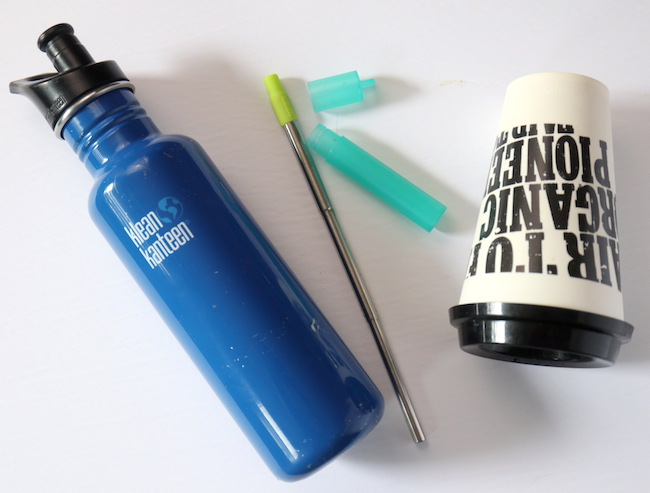
Coffee, water, straws: again, with the pandemic, most coffee shops are not allowing you to bring your own reusable coffee mug, but hopefully things will go back to normal eventually. In the mean time, if you do get a coffee, bring your cup home and recycle it, rather than putting it in the garbage. Carry a refillable water bottle with you and don’t buy plastic bottles of water. Most businesses have now also transitioned to recyclable straws (paper sucks, though. Yesterday I had a coffee at Grounds for Coffee, and they are using compostable sugarcane straws. Highly recommend), but it’s a great idea to carry a straw with you if possible. I have this cool telescoping one from Zoku.
Shopping
I carry a fabric shopping bag with me. I have one that folds down into a little pouch, and it is easy to carry. I also love these mesh produce bags, which means I don’t have to use the plastic ones at the store. Another great tip (which we can’t do right now) is to shop at bulk food stores like Bulk Barn, Nada or The Soap Dispensary. You bring your own mason jars or containers, and they weigh them, fill with product, and weigh again, so you just pay for whatever’s inside, and zero waste, zero plastic!
Kitchen
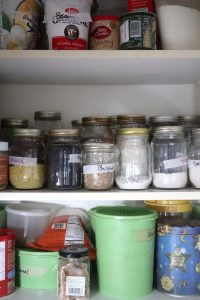 This, for me, is the hardest one. In some ways, I do great. I keep a pantry stocked with dry goods (most of which I buy in bulk) in mason jars and vintage tupperware I picked up at garage sales. But I’m guilty of using ziploc bags, plastic wrap and garbage bags. I do use compostable bags for my organic waste. An alternative to using ziploc bags are these silicone versions which you can wash and reuse again and again. An alternative to using plastic wrap is beeswax wrap. Or buy shower caps at the dollar store (still plastic, but reuse them) as bowl covers. I don’t have a solution for garbage bags, except to try to make a little garbage as possible so they last longer. If you buy things like chips, collect the bags (these are called soft plastics) and then recycle them at London Drugs.
This, for me, is the hardest one. In some ways, I do great. I keep a pantry stocked with dry goods (most of which I buy in bulk) in mason jars and vintage tupperware I picked up at garage sales. But I’m guilty of using ziploc bags, plastic wrap and garbage bags. I do use compostable bags for my organic waste. An alternative to using ziploc bags are these silicone versions which you can wash and reuse again and again. An alternative to using plastic wrap is beeswax wrap. Or buy shower caps at the dollar store (still plastic, but reuse them) as bowl covers. I don’t have a solution for garbage bags, except to try to make a little garbage as possible so they last longer. If you buy things like chips, collect the bags (these are called soft plastics) and then recycle them at London Drugs.
Bathroom
This is a hard one too! Nearly everything we buy at the drugstore is packaged in plastic. There are, however, alternatives like deodorant in recyclable paper packaging. This is another area where it’s pretty easy to shop in bulk and reuse your containers. Or try a plastic free shampoo bar. Bamboo toothbrushes can replace plastic ones, and even floss can be plastic free. In terms of shaving, get a safety razor and use bar shaving soap.
Clothes
If possible, choose clothing made from natural fibres like cotton or silk. Choose an eco-friendly dry-cleaner, and (this one is gonna be controversial) try shopping for your clothes second-hand. A lot of people are grossed out at the thought of wearing a random stranger’s clothes, but thrifiting is a great way to save money and the environment. You can even do online thrift shopping.
What have I forgotten? How do you try to make less waste and go plastic free in your life? Leave me all your best tips below!
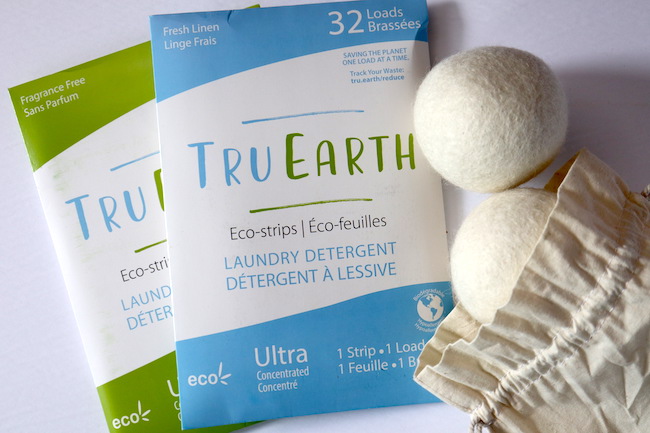
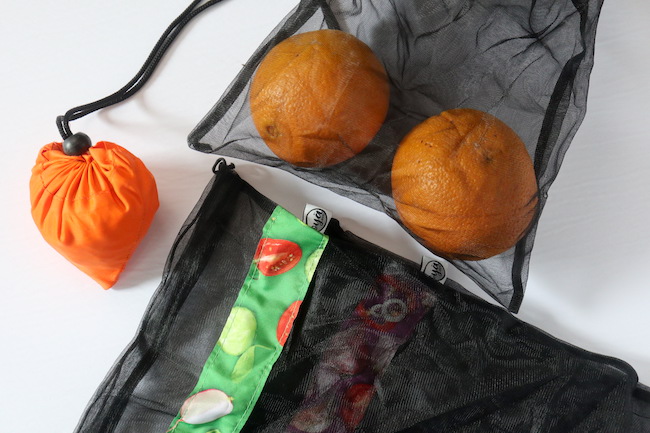
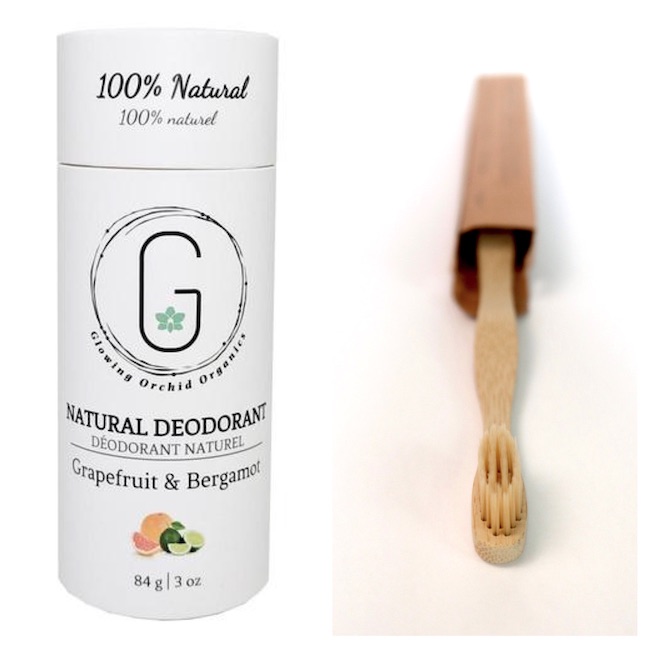
Great article, especially covering it room by room! One thing I’ll add is that plastic is not only a pollutant in the oceans (and on land) but let’s face it… we’re going to run out at some point because it comes from oil! A non-renewable, finite resource! If we use it sparingly and only as needed, we’ll be able to use it where it’s most important (Eg. hospitals) for generations to come. Lastly, (shameless plug) check out http://www.perk.eco, where we recycle coffee shop waste ! Refer your fave coffee shop to us 🙂